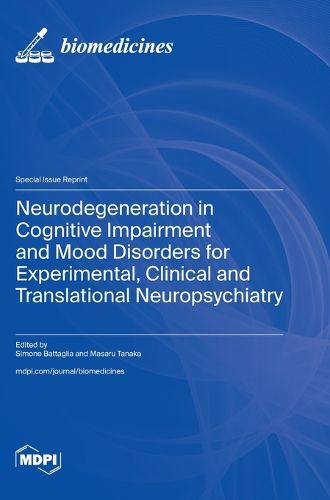Readings Newsletter
Become a Readings Member to make your shopping experience even easier.
Sign in or sign up for free!
You’re not far away from qualifying for FREE standard shipping within Australia
You’ve qualified for FREE standard shipping within Australia
The cart is loading…






This title is printed to order. This book may have been self-published. If so, we cannot guarantee the quality of the content. In the main most books will have gone through the editing process however some may not. We therefore suggest that you be aware of this before ordering this book. If in doubt check either the author or publisher’s details as we are unable to accept any returns unless they are faulty. Please contact us if you have any questions.
Neurodegeneration is a major problem in neuroscience and medicine, as it causes and worsens many neurological and psychiatric disorders. It involves gradually losing neurons at different brain levels, affecting cognition, emotion, behavior, consciousness, and attention. However, the current therapies are mostly symptomatic and ineffective. In light of these limitations, there is an urgent need to develop novel and transformative approaches, among which non-invasive brain stimulation (NIBS) holds considerable promise. NIBS techniques can modulate neural activity and safely and reversibly promote plasticity, presenting an avenue for exploring innovative treatment modalities. Moreover, the NIBS field is evolving rapidly, with ongoing research endeavors to elucidate its mechanisms of action, identify new clinical applications, and investigate synergistic interactions with pharmacological agents. This Special Issue covers the latest progress and challenges in studying neurodegeneration in cognitive impairment and mood disorders from experimental, clinical, and translational perspectives. It addresses the complexities and diversity of these conditions, the scarcity of disease-modifying treatments, the ethical and practical challenges of conducting research in the development and validation of novel methods such as NIBS, artificial intelligence, and drug repurposing. Collaborative efforts among various stakeholders are needed to improve our knowledge and treatment of neurodegenerative, underlying cognitive impairment, and mood disorders.
$9.00 standard shipping within Australia
FREE standard shipping within Australia for orders over $100.00
Express & International shipping calculated at checkout
This title is printed to order. This book may have been self-published. If so, we cannot guarantee the quality of the content. In the main most books will have gone through the editing process however some may not. We therefore suggest that you be aware of this before ordering this book. If in doubt check either the author or publisher’s details as we are unable to accept any returns unless they are faulty. Please contact us if you have any questions.
Neurodegeneration is a major problem in neuroscience and medicine, as it causes and worsens many neurological and psychiatric disorders. It involves gradually losing neurons at different brain levels, affecting cognition, emotion, behavior, consciousness, and attention. However, the current therapies are mostly symptomatic and ineffective. In light of these limitations, there is an urgent need to develop novel and transformative approaches, among which non-invasive brain stimulation (NIBS) holds considerable promise. NIBS techniques can modulate neural activity and safely and reversibly promote plasticity, presenting an avenue for exploring innovative treatment modalities. Moreover, the NIBS field is evolving rapidly, with ongoing research endeavors to elucidate its mechanisms of action, identify new clinical applications, and investigate synergistic interactions with pharmacological agents. This Special Issue covers the latest progress and challenges in studying neurodegeneration in cognitive impairment and mood disorders from experimental, clinical, and translational perspectives. It addresses the complexities and diversity of these conditions, the scarcity of disease-modifying treatments, the ethical and practical challenges of conducting research in the development and validation of novel methods such as NIBS, artificial intelligence, and drug repurposing. Collaborative efforts among various stakeholders are needed to improve our knowledge and treatment of neurodegenerative, underlying cognitive impairment, and mood disorders.